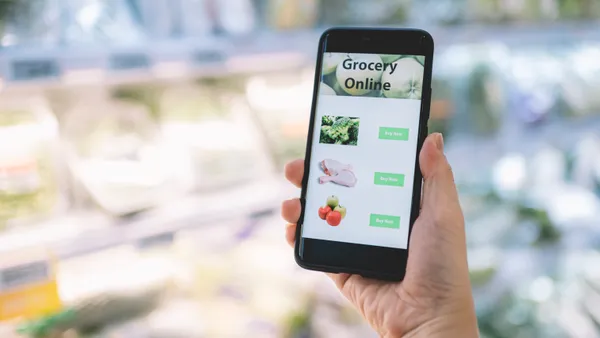Dive Brief:
- Urban shoppers are 90% more likely than the average shopper to rank online grocery capabilities as one of the top three most important factors in their grocery shopping experience, according to Acosta’s new report, The Urban Grocery Shopper.
- One-quarter of urban grocery shoppers report buying groceries online at least once a week, and 60% report ordering groceries for delivery, compared to less than 30% of rural and suburban shoppers.
- About 56% of urban dwellers use online outlets to purchase bulk items such as diapers and paper towels versus only 34% of suburban dwellers and 24% of rural residents.
Dive Insight:
Retailers are pouring substantial funds and resources into online shopping channels, and according to the Acosta report, their best bet is to focus their promotion and investment on city dwellers. Densely populated locations are often filled with young, busy consumers who report using online grocery shopping to save time.
The in-store experience is challenging for urban shoppers. With public transport, shoppers can only carry so much, and if they are driving, they have to fight traffic and busy grocery stores at peak hours. About 64% of survey respondents reported feeling that grocery stores are crowded and checkout time is too long.
In general, urban shoppers are less dependent on traditional supermarket banners to purchase health and beauty products as well as bulky items like paper products. They’re more likely to buy condiments and frozen food items at a non-traditional supermarket and they show a strong preference for prepared meals, with more than half of shoppers making special trips to the grocery store just to pick up a prepared food item in the last six months.
Grocery retailers can use this information from Acosta to their advantage to increase online sales while cultivating more consumer loyalty. Adding health and wellness items, bulk household and paper products and prepared foods or meal kits to online offerings could entice urban shoppers away from the competition.
With their high density, cities make fast, frequent grocery delivery much more attainable for grocery companies, and more services are available to city shoppers. Major frontrunners in the online grocery game include Walmart, Amazon, Kroger and Target. Costco has made notable gains recently, which could be due to its bulk product delivery. More niche players like FreshDirect have dominated New York City, challenging Walmart's Jet.com and Amazon in the area.












